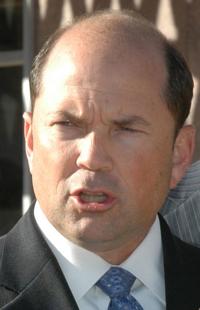When I saw former state Sen. Frank Antenori maneuvering to influence city elections this cycle, it made me wonder, “Since when does he care about Tucson?”
Antenori and his former campaign manager, Christine Bauserman, are behind robocalls to 10,000 Tucson phones saying that an incumbent Tucson councilman is a “sexual predator.” They have a dark-money “foundation” that funnels anonymous donations to their independent-expenditure group, Revitalize Tucson, which made the robo-calls against Democratic city council member — and candidate — Paul Cunningham.
At first I thought that phrase was a low blow, because while the city found Cunningham had sexually harassed city employees in 2012, his behavior was not criminal or that of what we typically call a “predator.”
Then it hit me like a tiny guided missile: Antenori has been caring about Tucson practically since he moved here and took a job at Raytheon in 2004! Just two years later, when Jim Kolbe announced he was leaving his seat in the U.S. House, Antenori volunteered to run for the Republican nomination. He lost, alas, and Gabrielle Giffords won the general election, beginning her five-year run in Congress.
Then, in 2008, Antenori won election to the state House and promptly went to work protecting Tucson and Arizona. That session he backed a resolution telling the federal government to cease and desist unconstitutional mandates against states like Arizona.
In the House, and after he joined the state senate in 2010, he got to work with his state colleagues advising the city he loved, Tucson, how to manage its business.
One of the laws he supported would have forced Tucson to have nonpartisan, ward-only elections — if not for the Supreme Court overturning it. This wasn’t a strong-arm tactic by a Republican Legislature against a Democrat-dominated city government, of course. Just a show of love and concern.
A bill he offered in 2011 would have forced cities with at least 500,000 residents to contract out any service that costs at least $75,000. Tucson, of course, met that threshold when Antenori introduced this well-meaning effort at ensuring private-sector discipline in the public sector.
His effort also would have forced cities — again, only cities like Tucson with populations over 500,000 — to slash their staffs to a number no higher than 0.4 percent of the city’s population. That would have reduced a city staff that had already dropped by several hundred almost in half, to around 2,500.
He was just trying to do what’s good for us.
We know that’s true because when he was in the Legislature, he asked to be referred to as being from Vail rather than from Tucson, even though he lived inside Tucson city limits in an area that had been recently annexed. He didn’t want to be associated with the “hippies” he said were running Tucson. To those buttoned-down hippies in City Hall, that was quite a compliment!
Then in 2011, Antenori and City Council member Steve Kozachik got into a little bit of a tiff, which led to this constructive criticism by Antenori in an Inside Tucson Business article:
“He doesn’t represent the people I represent. The majority of the people I represent pay taxes, probably the majority of people he represents don’t — or receive some government subsidy.”
Can’t you just feel the love for Tucson?
All that brings me to an act in Antenori’s legislative career that you may find most relevant to the current Tucson City Council race. In 2011, he introduced bills that would have prohibited cities from banning hunting within city limits and also have allowed the hunting of certain animals at night.
Those animals were jackrabbits, raccoons and predators such as skunks. Yes, skunks.
Is it possible Antenori smelled a skunk when he heard about Cunningham’s sexual harassment problem and concluded that made him a predator? And maybe he concluded that his beloved Tucson deserved protection?
We talked yesterday evening, Frank and I, and I could have sworn I heard him say, “Tucson and Pima County are lost causes” and “Maybe I shouldn’t live here anymore.”
I should have been shocked. But I also thought I heard him say: “The city of Tucson is anti-growth and anti-business. Why would I want that cancer to be growing in my beautiful state of Arizona that I do love?”
Certainly the fact that Antenori’s house on Tucson’s southeast side is for sale could not be a reflection of his love for the Old Pueblo. (“Telescoping flagpole makes for easy flag adjustments,” the description says.)
He’s probably just looking for a new house in central Tucson — maybe in Ward 6, where people get all those government benefits.




